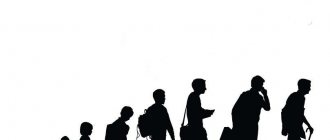Genius is perhaps one of the most mysterious phenomena. The birth of a genius cannot be planned or predicted; it always happens suddenly and, as a rule, leaves a deep mark on the history of mankind. Such people are able to change any ideas about science, art and other important areas of life. Any of us knows their names: Wolfgang Amadeus Mozart, Isaac Newton, Leonardo da Vinci, Johann Goethe, Blaise Pascal - this is only a small part of the geniuses who influenced the development of mankind.
The nature of this phenomenon has long been subject to close study, but there is still no exact answer even to the initial question: what is genius? Scientists' opinions differ quite widely.
- Plato believed that genius was given to man by God.
- The Italian psychiatrist Cesare Lombroso was convinced that it was a symptom of madness, and even wrote a book on this topic, “Genius and Insanity.” Indeed, many geniuses fell into madness, but not all.
- Some other scientists believe that genius is the sublimation of sexual complexes.
These three versions are far from the only ones; each direction of psychology and psychiatry has its own theory. Moreover, none of them has such comprehensive evidence to once and for all give an accurate definition of genius.
General Definition of Genius
Despite the global differences in the views of scientists on this phenomenon, there is still a certain common denominator that generally provides an acceptable definition. Genius is the highest level of human development in one or more areas of knowledge and skills. Moreover, such people do not go unnoticed, they always make some outstanding discoveries, invent something new - in general, one way or another, they prove themselves.
Sometimes genius is confused with talent and giftedness. In fact, there are several important signs that help distinguish one from the other.
Giftedness
Giftedness is a general high level of ability . Gifted people can successfully cope with a task, as well as develop qualitatively and quickly. Many young children initially have this quality, which is why starting early is considered so important. After all, giftedness, with the right approach, can develop into talent.
Talent
This is the next step after giftedness. Talent is considered an even higher level of ability. But, as a rule, this happens in one direction. The popular saying “A talented person is talented in everything” is not entirely true. Usually, having passed through the stage of general talent, a person begins to pay more attention to what is most interesting to him. Accordingly, the main development further occurs in this area. This does not mean that a talented person's abilities are limited, it is usually simply a matter of lack of time. Who knows how much these people could do if the days were just a little longer.
Genius
Finally, we come to the third stage of ability development. This is genius. As mentioned above, at this stage is the highest point of development . Like talent, genius is usually limited to one area. The difference is that in other areas of life a brilliant person can be downright stupid, while talented and gifted people are usually more or less versed in any field.
How to raise a genius from a child
Many parents consider their children gifted and brilliant not objectively, but based on their own desire for the child to be better than others. The makings of genius can only be discovered by impartially observing the child and giving him the right to choose his activity.
Knowing what genius means, you can, with patience, carefully observe the child in order to initially identify the makings of genius.
It is important not to interfere with the child’s search for himself and his favorite direction. In addition, parental support is extremely important for the child himself, even if he has chosen a non-standard activity. Self-confidence will allow a little person to double his potential and achieve high results at a young age.
Olga Figura
Signs of genius
- Powerful intuition . As a rule, a genius does not need to have the full range of knowledge in the desired field. What he lacks in information, he more than makes up for with actions on a whim.
- Developed imagination. It is this that serves as a guide for genius, giving the opportunity to create without relying on existing standards.
- Uniqueness . As a rule, geniuses do not develop what they already have, but create something fundamentally new, different from everything that came before.
- Perseverance, attentiveness, hard work. Without these qualities it is difficult to achieve anything. And a genius, as we have already said, must definitely leave his mark on history.
- Maximum passion. It doesn’t matter what field we are talking about, science or art - when a genius creates, everything else ceases to exist for him.
- A high self-evaluation . Geniuses are usually absolutely self-sufficient individuals. They believe in themselves and their business. Such an attitude is simply necessary so that a person can give all of himself to what he does.
Genius has one more feature. A person’s ordinary abilities can be developed into giftedness, and then into talent. But not genius - this is a quality that either exists initially or does not exist at all. Usually a genius is visible in early childhood, while talent can manifest itself at any age, even old age .
Scientists will probably struggle for a very long time to figure out who a genius is, thanks to what factors he is born, and why he is so rare.
One thing is obvious: no matter what area genius manifests itself, it will always be able to declare itself and will certainly leave a deep mark in the history of mankind.
Being a genius and having exceptional intellectual abilities are not the same thing. Smart people are a dime a dozen, yet not many of them can boast of significant achievements. What is important here is creativity, the ability to force your own imagination to work in almost any situation.
What makes a genius a genius?
Take Benjamin Franklin, for example. He lacked Hamilton's outstanding analytical skills and Madison's philosophical depth. However, his lack of classical education did not prevent the self-educated Franklin from becoming the best inventor, diplomat, scientist, writer and business strategist of the American Enlightenment. By flying a kite, he proved the electrical nature of lightning and invented a special rod to tame it. He built efficient stoves, mapped the Gulf Stream, created bifocals, magnificent musical instruments, and a unique style of crude American humor.
Albert Einstein followed a similar path. As a child, it took him a long time to learn to speak, so his parents had to seek advice from a doctor. House servants called Albert “stupid,” and one relative considered him “mentally retarded.” In addition, Einstein openly did not want to obey any kind of authority, as a result of which one teacher kicked him out of school, and another declared that the boy would never be any good - the verdict he rendered still amuses his descendants. These traits made Einstein the patron saint of absent-minded schoolchildren throughout the world.
But Einstein's contempt for authority also led him to question established concepts in ways that the academy's well-trained staff had never even considered. And his slow speech development allowed him to maintain freshness of perception when observing those everyday phenomena that other people took for granted. “The normal adult does not think at all about the problem of space and time,” Einstein once explained. “I developed intellectually so slowly that space and time were occupied by my thoughts when I became an adult.”
This was the case in 1905, when he was a third-class examiner at the Swiss Patent Office, having graduated from the Zurich Polytechnic, where he finished fourth in his group of five graduates. Einstein revolutionized our understanding of the universe by proposing two cornerstones of modern physics: the theory of relativity and quantum theory. And he did this by abandoning one of the basic assumptions made by Isaac Newton at the beginning of his Principia, that time runs parallel, second by second, no matter how we observe it. Today, the name and image of Einstein - a halo of tousled hair, a piercing gaze - are inseparable from our ideas about a typical genius.
Then there's Steve Jobs. Much like Einstein, who, while agonizing over his theories, picked up the violin and played Mozart (he said it helped him reconnect with cosmic harmony), Jobs believed in the high purpose of beauty, believed that art, precision and the humanities must be connected. After dropping out of college, Jobs took calligraphy and dance classes, and then went to seek spiritual enlightenment in India - as a result, every product he created, from the Macintosh to the iPhone, unlike the products of his competitors, had an almost spiritual quality. nature's beauty.
© ETH Library Albert Einstein in Laeken, Belgium
Studying the biographies of such people led me to Leonardo da Vinci, who, in my opinion, is the greatest creative genius in history. Again, this does not mean that he was exceptionally intelligent. Da Vinci could not boast of the superhuman intellect of such theorists as Newton or Einstein, nor the mathematical abilities of his friend Luca Pacioli.
But he could think like an artist and a scientist, and this gave him something more valuable: the ability to visualize theoretical concepts. Pacioli may have developed Euclid's theories by conducting influential studies in the fields of mathematical perspective and geometric proportions. However, it was da Vinci's illustrations that brought them to life - images of rhombicuboctahedra and dozens of other polyhedral geometric shapes - which ultimately turned out to be more important. Over the years, he produced this kind of illustration for such sciences as geography (the three-dimensional maps he drew for the military leader Cesare Borgia), anatomy (his famous drawings of the “Vitruvian Man” and the fetus in the womb), and many others - and all this is simultaneously with work on a number of works that have become masterpieces of world art.
Like Franklin, da Vinci was largely self-taught. He was born out of wedlock, which meant he could not follow in the footsteps of his notary father and was not entitled to attend one of the “Latin schools” where the classics and humanities were taught to the sleek young men of the early Renaissance. Moreover, like Einstein, da Vinci showed exceptional independence.
It seemed that he was often hurt by his own illiteracy; it was not for nothing that he called himself “uneducated”, not without irony, but at the same time da Vinci could not stand “stupid people” who dared to treat him without due respect. “They walk around, putting on an important air, filled with conceit, dressed up and decorated with the results not of their own, but of other people’s labors,” he wrote in one of his notebooks.
Thus, da Vinci learned to challenge conventional wisdom, ignoring the dusty scholasticism and medieval dogmas accumulated over the millennia since the decline of classical science. He was, in his own words, a student of experience and experiment. “Leonardo da Vinci, disscepolo della sperientia,” he once signed. This approach to problem solving was revolutionary to say the least, foreshadowing the scientific method developed more than a century later by Francis Bacon and Galileo Galilei. And he elevated da Vinci above even the greatest minds of the time. “Talent reaches a goal that no one can achieve,” wrote the German philosopher Arthur Schopenhauer. “Genius is the one that no one can see.”
Die Welt 02/24/2017 Estadão 08/29/2017 Lidovky 06/30/2016 As with Einstein, da Vinci's most inspiring trait was curiosity. Thousands of pages in his surviving notebooks are replete with observations that interested the scientist. He wanted to know what causes people to yawn, how people walk on ice in Flanders, what the methods are for squaring a circle, what causes the aortic valve to close, how the eye perceives light, and what this means for artistic perspective. He set himself the task of understanding such issues as the structure of the calf placenta, crocodile jaws, facial muscles, and understanding the nature of moonlight and the edges of shadows. “Describe how a woodpecker’s tongue works,” he noted in one of my favorite entries. Da Vinci's great and noble ambition was to know everything unknown about everything that could be known, including the cosmos and our place in it.
Often his curiosity was aroused by things that most of us, due to our age, do not even think about. Take, for example, the blue sky. We see it almost every day, but it’s unlikely that many of us, as adults, continue to wonder why it is that particular color. But da Vinci’s interest in this subject did not wane. He wrote many pages in his notebook, exploring how various hazy or bright shades of blue appear as a result of the scattering of light by water vapor. Einstein also puzzled over this question: based on the work of Lord Rayleigh, he developed a mathematical formula for the scattering of light.
Da Vinci never stopped his observations of the world around him. Walking along the fortress moats of the castle of Milan, he paid attention to the alternate movement of pairs of wings of four-winged dragonflies. Walking through the streets of the city, he watched how the facial expressions of people talking to each other correlated with their emotions. When he saw birds, he noted which ones moved their wings faster on the ascent and which ones moved faster on the descent. As he poured water into a bowl, he watched the formation of whirlpools.
Like Franklin—who ran away on a ship to England as a teenager and later measured the temperature of ocean currents, becoming the first person to accurately map the Gulf Stream—da Vinci tirelessly tracked and studied the swirling movements of the air during his travels.
Thanks to these observations, his paintings were filled with a number of vivid artistic details, from the water ripples around the ankles of Jesus standing in the Jordan River in the painting “The Baptism of Christ” and ending with incredible drawings of the Flood. He was also the first person to explain how blood flow from the heart causes the aortic valve to close. And his drawing of the "Vitruvian Man" - a work that combines anatomical precision with stunning artistic beauty - has become a celebrated symbol of the connection between art and science.
© CC0 / Public Domain, Mona Lisa by Leonardo da Vinci
There are geniuses in a certain field, such as Leonhard Euler in mathematics or Wolfgang Amadeus Mozart in music. But, in my opinion, the most interesting geniuses are those who are able to discern a system in the infinite beauty of nature. Da Vinci's genius spanned many disciplines at once. He cleaned the flesh from the faces of dead people, outlined the muscles responsible for the movement of the lips, and then from under his brush the most unforgettable smile in the world was born. He studied human skulls, made multi-layered drawings of bones and teeth, and then, with incredible physiology, he embodied in painting the agony of St. Jerome in the desert. He explored the mathematical laws of optics, showed how light rays hit the cornea, and then in The Last Supper he created the magical illusion of a visual change in perspective.
Of course, there were many other knowledge-hungry encyclopedists, and other Renaissance men emerged during the Renaissance. But none of them painted a portrait of the Mona Lisa, much less did so at the same time as creating unsurpassed anatomical drawings from multiple dissections, as well as diagrams for the diversion of rivers, an explanation of how light reflects from the Earth to the Moon, a dissection of the still beating the heart of a slaughtered pig to understand the workings of the ventricles, the design of musical instruments, the production of theatrical performances, the use of fossils to challenge the biblical account of the flood, and then the creation of drawings of the flood. Da Vinci was a genius, but not simply because he was a man of great intelligence. He was, more importantly, the embodiment of the universal mind, a man who took more interest in more things than anyone in history.
Walter Isaacson is the former editor-in-chief of Time and the author of Benjamin Franklin: An American Life; Einstein: His Life and Universe; Steve Jobs and Leonardo Da Vinci, on the basis of which this article was written.
InoSMI materials contain assessments exclusively of foreign media and do not reflect the position of the InoSMI editorial staff.
Virginity and masturbation
Agree, at the end of the first part of American Pie it was immediately clear to everyone who was smarter!
There is an opinion that an intelligent person spends less time on sex. The reasons for this indicator may go much deeper than the simple explanation that no one wants to hug assholes.
But scientists recently conducted a study in which they determined that the number of sexual partners among more intelligent students is significantly lower than among their colleagues with average intelligence. Also, the virginity rate of smarter people is 45% higher than that of the general student population.
But there are a number of scientific explanations for all this:
1 Science has proven that the hormone testosterone can suppress intelligence, which means that smarter people have significantly less of it, which makes them less aggressive and relegates girls to the background.
2 An intelligent person thinks more often about the risk of pregnancy or illness and is aware of its consequences.
3 If a person is able to teach himself, most often he will lead a reclusive lifestyle and looks at parties and parties as an unnecessary risk. We should also not forget that introverts are also uncomfortable being in large crowds of people, and masturbation or abstinence does not pose a risk at all.
Concept in psychology
If society defines genius as a spark of God, then psychoanalysts consider it the fruit of a defense mechanism of the psyche - sublimation. When such protection, which is responsible for relieving internal stress, is triggered, the overvoltage energy is directed toward achieving social goals. According to psychologists, a genius person is capable of insight.
Choleric - what kind of person is this?
By the way. Insight is a breakthrough on an intuitive level when solving a given intellectual problem.
From a psychological point of view, the state of genius is nothing more than a deviation from the norm. It has a genetic predisposition and sometimes borders on madness. Such people may have low emotional intelligence, which contributes to the development of bipolar affective disorder and schizophrenia. In this case, it is the disease that helps create brilliant masterpieces.
Noticed. Geniuses are “people not of this world” and are often not adapted to ordinary life. They are so passionate about what they do that they live in the gestalt moment (“here and now”). Such individuals are helpless in everyday situations and sometimes cannot find a common language with other people.
Genius and madness
In the dictionary D.N. Ushakova
GENIUS, genius, husband. (·lat. genius) (·book). 1. Highest creative ability in scientific or artistic activity. Scientific genius of Lenin. 2. A person who has a similar ability. Darwin was a genius. 3. In Roman mythology - a lower deity, the patron spirit of a person, clan, or locality. | In fantasy literature - a supernatural creature, the personification of good, evil, etc. | trans. (with adj. good, evil). About a person who has something beneficial or a bad influence on someone, bringing *****
In the dictionary Dictionary of foreign words
I, m.
1. Highest creativity. Poetic city of Pushkin.||Wed. TALENT" title='TALENT, TALENT is, what is TALENT, TALENT interpretation'>TALENT I.
2. shower A person who has this ability. He doesn't look like a genius.||Cf. TALENT" title='TALENT, TALENT is, what is TALENT, TALENT interpretation'>TALENT I.
3. In ancient Roman mythology: the spirit is the patron of man, and later generally the personification of good, evil, etc. Good Mr. (one who helps someone, has a beneficial influence on someone). “The genius of pure beauty” (Pushkin).
Share the meaning of the word:
In Efremova's dictionary
Accent: genius
- m. outdated The highest degree of creative talent; manifestation of such talent.
- Outstanding abilities, talent, talent in a certain field of activity.
- Someone who has the highest degree of creative talent.
- Spirit, patron of a person, clan, area.
- The spirit is the patron and inspirer of creativity.
Myth No. 4. Genius is a gloomy loner
There are many similar characters in popular culture. And although geniuses, especially writers and artists, are more prone to mental disorders, particularly depression, they are rarely loners. They want to be around like-minded people who can calm them down and reassure them that they are not crazy. That’s why geniuses always have a “support group.”
Freud had the Vienna Psychoanalytic Society, which met at his place on Wednesdays, and Einstein had the “Olympic Academy”. Impressionist artists met weekly and painted together in nature to keep their spirits up in response to the rejection of critics and the public.
Of course, geniuses need to be alone sometimes, but they often switch from solitary work to communicating with others. For example, the Scottish philosopher David Hume sat in his office for weeks and worked, but then he always left and went to the local pub to live and communicate like other people.










